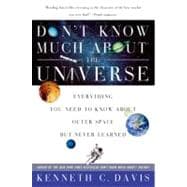
Don't Know Much About the Universe
- ISBN13: 9780060932565
- ISBN10: 0060932562
- eBook ISBN(s): 9780061965883
- Edition: Reprint
- Format: Paperback
- Copyright: 2002-01-01
- Publisher: HarperCollins Publications
-
Your order must be $35 or more to qualify for free economy shipping. Bulk sales, PO's, Marketplace items, eBooks and apparel do not qualify for this offer.








